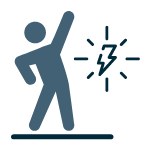Although there is currently no cure for Parkinson’s disease, there are many ways you can effectively manage the disease and its symptoms. People living with Parkinson’s experience motor symptoms that restrict movement or limit control over daily activities, but they also might experience mild to severe non-motor complications that affect mood, cognitive function, sleep and basic bodily functions.
Here are some tips to help manage Parkinson's disease and slow the progression or severity of symptoms:

Energize your body.
Fuel your body with a healthy diet that includes whole-food and plant-based meals. And keep your body moving with weekly exercise, such as walking, biking, swimming, yoga or golf. In addition to improving your physical and emotional health, regular exercise may help improve your balance and mobility.

Support your emotional well-being.
Consider counseling or joining a support group to share your experiences and feelings with others who can support your emotional health. Being a part of a community of others who are on a similar journey can relieve stress for both those diagnosed with Parkinson’s and their loved ones.

Simplify your routine.
It is beneficial to build a daily routine for yourself and to simplify daily tasks. Take control over the activities that you can, but welcome assistance for the activities that may get more difficult to do independently over time, like bathing, getting dressed and driving. Non-motor symptoms can also be better managed with a simple routine, too, such as aiming to get the same amount of sleep each night by developing a nighttime schedule.

Ask your care provider about the right medications for you.
Many medications can help you manage your symptoms, so it is likely that multiple medications and doses may be prescribed to you by your doctor. Once you are prescribed medications, follow your doctor’s instructions for taking the medication and monitoring their possible side effects. Add your medications into your routine to help you stay on schedule.

Seek out advanced treatments.
In addition to medication, there are multiple therapeutic interventions available to treat symptoms of Parkinson’s disease, including deep brain stimulation (DBS) and physical, occupational or speech therapy. What’s right for one patient might not be right for another, so discuss your personalized treatment plan with your doctor.
You can read more about rehabilitation for Parkinson’s disease at TIRR Memorial Hermann here.
Contact Us
Please fill out the fields below, and we will contact you.